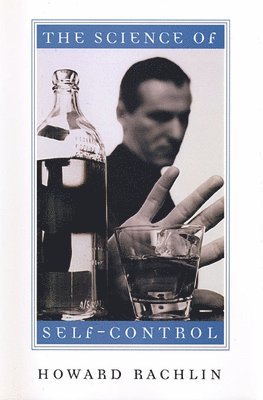
- Format
- Häftad (Paperback / softback)
- Språk
- Engelska
- Antal sidor
- 240
- Utgivningsdatum
- 2004-03-01
- Förlag
- Harvard University Press
- Illustrationer
- 43 line illustrations
- Dimensioner
- 233 x 162 x 16 mm
- Vikt
- Antal komponenter
- 1
- Komponenter
- WORKSHEET
- ISBN
- 9780674013575
- 272 g
The Science of Self-Control
- Skickas från oss inom 3-6 vardagar.
- Fri frakt över 249 kr för privatkunder i Sverige.
Passar bra ihop
De som köpt den här boken har ofta också köpt The Anxious Generation av Jonathan Haidt (inbunden).
Köp båda 2 för 911 krKundrecensioner
Fler böcker av Howard Rachlin
-
The Matching Law
Richard J Herrnstein, Howard Rachlin, David I Laibson
-
The Escape of the Mind
Howard Rachlin
-
The Effect of Delay and of Intervening Events on Reinforcement Value
Michael L Commons, James E Mazur, John A Nevin, Howard Rachlin
-
Effect of Delay and of Intervening Events on Reinforcement Value
Michael L Commons, James E Mazur, John A Nevin, Howard Rachlin
Recensioner i media
This book combines behavioral psychology and economics in an unusual fashion. Of particular importance is his emphasis on the sensitivity of individual choices to the social environment. I recommend Rachlin's new book to everyone with an interest in the psychological foundations of individual behavior. -- Gary S. Becker, Nobel laureate in Economics This excellent book contains the kind of brilliant and unique insights that the behavior-analytic community has come to expect from Howard Rachlin. Its contribution, however, will be accessible more broadly. Almost any intelligent person will find much to reflect on here, relevant to many social problems and his or her own life. -- William M. Baum, Professor of Psychology, University of New Hampshire This is a lucid and important book that is chock full of insights into why people behave the way they do. Rachlin reviews research and theory on self-control with a suitable blend of scientific rigor and lively prose. The book advances the field by presenting in a systematic fashion what is known about one of the central phenomena in behavior, self-control, and by enhancing (with the help of some illuminating and engaging examples) our understanding of self-control and how it may be understood in the larger context of choice. -- Edmund Fantino, Professor of Psychology and Neuroscience, University of California, San Diego It is rare that an academic psychology book can change your life. This one can. It combines ideas from the behavioral psychology laboratory with modern economic reasoning to provide a theoretical account of human impulsiveness, addiction (including multiple addictions), relapse, craving, and commitment (what a clinician like me would call the psychoanalytic conflict between pleasure and reality principles). Although Rachlin denies that this is a self-help book, it contains numerous insights and prescriptions relating to alcoholism, gambling, heroin addiction, eating disorders, and other serous human conflicts. -- Marvin Frankel * Contemporary Psychology * Howard Rachlin has spent much of his illustrious career exploring the science of self-control, the subject of this fascinating book. In our opinion the book may be appreciated in at least four overlapping ways. First of all, this is a textbook on self-control suited for an advanced undergraduate or graduate class. Second, it is a theoretical and empirical primer for understanding self-control, including some useful general applications to self-control in our everyday lives. Third, it is a forum for presenting some intriguing principles about behavior, especially as related to self-control. And finally, it serves as a vehicle to advocate a broad general theory of behavior, teleological behaviorism...The powerful and intriguing analysis presented in The Science of Self-Control has broad applicability, whether or not we accept the author's view of teleological behaviorism. This is indeed 'a good read.' -- Edmund Fantino and Stephanie Stolarz-Fantino * Journal of the Experimental Analysis of Behavior * Howard Rachlin's The Science of Self-Control is a masterwork by a master scientist. Written with elegant simplicity, exquisite precision and admirable economy, this brief 220-page book combines experimental detail, astute generalizations, mathematical rigor, and philosophical breadth-all the elements of first-rate science. Not a handbook for practitioners but a treatise on theory, it nevertheless includes many useful insights for persons seeking more felicitous ways to manage behavior, their own or that of others. Such is its authority that I expect it to become a fixture in the libraries of experimental psychologists and practicing psychotherapists, but such is the grace and clarity of its writing that I also think it will be read with pleasure by many intelligent laymen. -- Max Hocutt * Metapsychology *
Övrig information
Howard Rachlin is Distinguished Professor of Psychology, Emeritus, at Stony Brook University.
Innehållsförteckning
Introduction 1. Habit and Willpower 2. Simple Ambivalence 3. Complex Ambivalence 4. The Lonely Addict 5. Soft Commitment 6. Rules and Probability 7. Self-Control and Social Cooperation Notes References Index
Du kanske gillar
-
Atomic Habits
James Clear
Häftad


